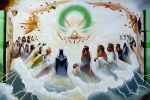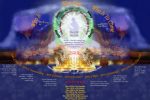I DON’T WANT TO MISS HEAVEN! (II)

The LORD God does not break His promises. What He promised the Old Testament Israel He has also given to the spiritual Israel i.e. Christians in Hebrews 13:5, “Let your conversation be without covetousness; and be content with such things as ye have: for he hath said, I will never leave thee, nor forsake thee.” The English translation fails to render the total import. The adverb ‘never,’ ou mē (oo may), is a double negative strengthening the denial; it comes from two words: ou (oo) ‘the absolutely negative adverb; no or not,’ and mē (may): ‘A primary particle of qualified negation (whereas ou expresses an absolute denial); (adverbially) not, (conjugationally) lest.’ ‘Nor’ is oude (oo-deh’) {From ou and de (deh): A primary particle (adversative or continuative); but, and, etc.}; not however, that is, neither, nor, not even.’ So many reassuring negatives are couched in this verse.

Rev. Chris Okotie expounds the promise of the Lord thus: “I can’t, I couldn’t, I will not leave you.” Clark Commentary puts it this way: “There are no less than five negatives in this short sentence, and these connected with two verbs and one pronoun twice repeated. To give a literal translation is scarcely possible; it would run in this way: “No, I will not leave thee; no, neither will I not utterly forsake thee.” Those who understand the genius of the Greek language, and look at the manner in which these negatives are placed in the sentence, will perceive at once how much the meaning is strengthened by them, and to what an emphatic and energetic affirmative they amount.”

2Corinthians 5:21, “For he hath made him to be sin for us, who knew no sin; that we might be made the righteousness of God in him.” The auxiliary ‘hath’ perfects the main verb ‘made’ which in the Greek is poieo (poy-eh’-o): ‘to make or do {in a very wide application, more or less direct; properly refers to a single act}.’ The Bible does not use another differing ‘made’ prasso (pras’-so) meaning: ‘to practice, i.e. perform repeatedly or habitually.’ The righteousness which the Lord ‘made’ for us is a once and forever righteousness. No one needs to do anything about this righteousness again, in fact any human righteousness will only pollute what Jesus has perfectly made. The second ‘made’ is ginomai (ghin’-om-ai) ‘1. to cause to be (“gen”-erate) 2. (reflexively) to become (come into being).’
Ginomai assures us that we have become righteous people, as born again individuals. The preposition ‘in’ is en (en) “in,” at, (up-) on, by, etc. [a primary preposition denoting (fixed) position (in place, time or state), and (by implication) instrumentality (medially or constructively), i.e. a relation of rest].’ I honestly cannot come to any understanding of the whiney stance of my fellow Christians when the ‘in’ found in the last part of the verse above shows that our righteousness resides in God. It is not a possession of any believer. It finds a resting place in the righteous Lord God Almighty. We are righteous forever in the Eternal Jehovah. Amen!

1John 4:10, “Herein is love, not that we loved God, but that he loved us, and sent his Son to be the propitiation for our sins.” God, without any shred of doubt, is the Initiator of our salvation. Only the Author knows the story more than any other, and this salvation narrative happens to be His story. We did not initiate the spiritual cleansing of our nature. We did not ask Him to do anything about it. Grace. Nothing but graceful magnanimity.

Get born again by praying this prayer with all your heart and truthfully: Dear heavenly Father, I come to You now in the name of Jesus Christ. I believe in my heart that Jesus is the Son of God. I believe in my heart that Jesus died for my sins and You raised Him from the dead. I confess with my mouth that Jesus is Lord, and I receive Him as my Lord and my Saviour. I give God all the glory, Amen. (…to be continued…)
Read part I here
Read part III here
Visits: 173



